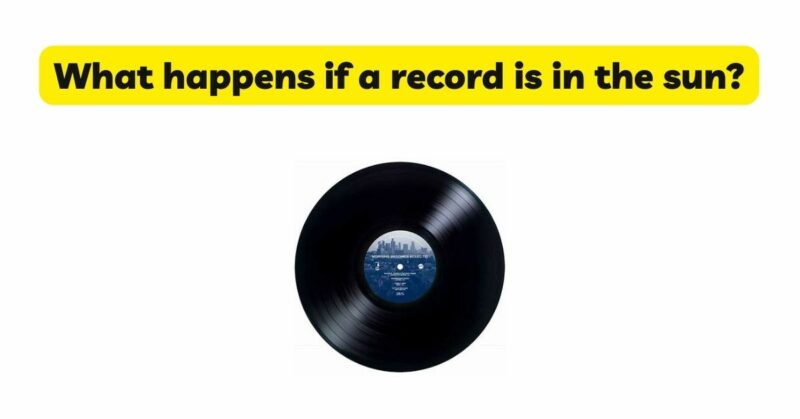Vinyl records have experienced a resurgence in popularity, captivating music enthusiasts with their warm sound and nostalgic charm. As collectors, we strive to protect and preserve our vinyl collections to ensure their longevity. One common concern is the potential damage caused by exposing records to sunlight. In this article, we will explore what happens when a record is exposed to the sun, delve into the mechanisms behind its effects, and provide practical tips to safeguard your cherished vinyl collection.
Understanding Sun Exposure on Vinyl Records:
Sun exposure, particularly when it involves direct sunlight, can have adverse effects on vinyl records. To understand the impact, it is essential to examine the specific ways in which sunlight can damage these delicate musical artifacts.
- Heat: One of the immediate consequences of placing a record in direct sunlight is the generation of heat. Sunlight contains infrared radiation that can raise the temperature of the record’s surface and the air around it. This heat can cause the vinyl to expand, leading to warping or distortion of the record. Warped records not only compromise the sound quality but can also damage the turntable’s stylus and tonearm.
- Ultraviolet (UV) Radiation: UV radiation is another significant concern when it comes to sun exposure. Sunlight contains UV rays, which can be harmful to various materials, including vinyl records. The protective coating on the record’s surface is particularly vulnerable to UV damage. Over time, UV radiation breaks down the chemical bonds in the coating, resulting in discoloration, fading, and degradation. UV rays can also affect the stability and integrity of the PVC material itself, potentially compromising the grooves and diminishing the record’s playback quality.
Effects of Sun Exposure on Vinyl Records:
- Discoloration and Fading: Vinyl records exposed to sunlight may experience discoloration and fading. The vibrant colors and artwork on album covers and labels can fade or become dull due to prolonged UV exposure. This not only affects the visual appeal of the record but can also diminish its value as a collectible item.
- Loss of Audio Quality: Sun exposure can impact the audio quality of vinyl records in several ways. Warping caused by heat can result in the stylus skipping or jumping across the grooves, leading to distorted playback or even rendering the record unplayable. Additionally, UV damage to the PVC material can degrade the grooves themselves, causing surface noise, reduced dynamic range, and compromised fidelity.
- Deterioration of Protective Coating: The protective coating on vinyl records serves as a barrier against scratches, dust, and other contaminants. When exposed to sunlight, the protective coating can degrade, becoming brittle and prone to cracking. This compromises its ability to safeguard the record’s surface, making it more susceptible to further damage.
Practical Tips for Sun Protection:
- Storage Location: Select an optimal storage location for your vinyl collection, preferably away from direct sunlight. Choose a cool, dry area in your home, such as an interior room or a dedicated vinyl storage unit. Avoid placing records near windows or glass surfaces that can amplify sunlight exposure.
- UV-Blocking Sleeves: Utilize UV-blocking inner sleeves to provide an additional layer of protection against UV radiation. These sleeves are specifically designed to filter out harmful UV rays while allowing visible light to pass through. Using UV-blocking sleeves helps minimize discoloration, fading, and UV damage to the record’s surface.
- Display Cases and Covers: If you prefer to display your vinyl records, consider using display cases or shelves that offer UV protection. These specialized cases use materials that filter out UV radiation, shielding your records from sun damage while showcasing them. Additionally, using outer protective covers for individual records adds another layer of defenseagainst sunlight exposure, as well as dust and other environmental factors.
- Limited Sunlight Exposure: If you choose to enjoy your vinyl records in a room with natural light, position your turntable and records away from direct sunlight. Avoid placing them near windows or areas where sunlight can directly reach the records. Consider using blinds, curtains, or UV-filtering films on windows to reduce the amount of sunlight that enters the space.
- Regular Rotation: To minimize the effects of sunlight exposure, regularly rotate your vinyl records. By periodically swapping records between storage spaces and playback, you ensure that no single record is consistently exposed to sunlight for prolonged periods. This practice helps distribute any potential damage more evenly across your collection.
- Monitoring Environmental Factors: In addition to sunlight exposure, it is crucial to monitor and control other environmental factors that can affect the condition of your vinyl records. Maintain a stable temperature and humidity level in the storage area to prevent warping, mold growth, and other forms of damage. Avoid areas with excessive heat, high humidity, or extreme temperature fluctuations, as these conditions can exacerbate the effects of sunlight exposure.
Conclusion:
Sun exposure can have detrimental effects on vinyl records, including heat-induced warping, discoloration, fading, and degradation of the protective coating and PVC material. Ultraviolet radiation from sunlight poses a particular risk, as it can break down the chemical bonds in the coating, leading to further damage over time. It is essential to take proactive measures to protect your vinyl collection from sun damage.By storing records in a suitable location away from direct sunlight, utilizing UV-blocking inner sleeves, using display cases or covers that offer UV protection, limiting sunlight exposure, rotating records regularly, and monitoring environmental factors, you can minimize the risks associated with sun exposure. By doing so, you ensure the longevity, audio quality, and visual appeal of your vinyl records, allowing you to enjoy their nostalgic sound for years to come.


